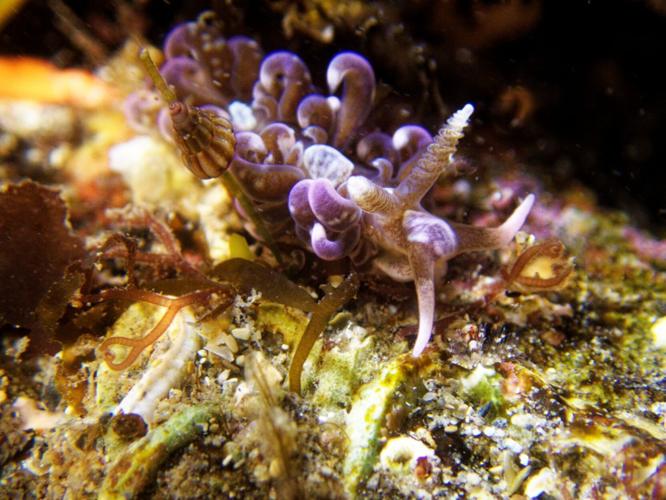
Spurilla neapolitana was spotted in the United Kingdom waters for the first time. (Charlotte Cumming via SWNS)
By Lauren Beavis
A "groundbreaking" sea slug discovery has been made - in a UK first.
The nudibranch Spurilla neapolitana, typically found in much warmer climates, has been discovered in Cornwall.
The colorful sea slug is a usual resident in the Caribbean, Mediterranean, and along the western Atlantic.
Until now, its most northerly sighting was in Brest, France, in August 2025.
The team at Cornwall Wildlife Trust has said its discovery in the UK indicates how increasingly warming seas "are influencing the distribution of marine animals".
Ranging in color from pink to orange, this sea slug is known for the flattened, long, thick outgrowths on its body (which give rise to its French common name, limace à bigoudis, roughly translated as “hair curler slug”).
The rare discovery was made by Cornwall Wildlife Trust volunteer, Charlotte Cumming, at one of the Trust’s Shoresearch Week events at Prisk cove on the Helford.

(Charlotte Cumming via SWNS)
Charlotte said: "Prisk Cove is one of my favourite shores and, as ever, it was low tide and I was looking through the seaweeds along a reef when this little nudibranch caught my eye.
“It was less than 10mm long and looked similar to a slug I have seen before with its curled cerata, although this one was much more purple.
“It’s quite difficult to see the back of the camera underwater in bright sunlight, so I took a few shots and thought no more of it."
Charlotte explained that it was not until later that evening, when she was looking at the photos on a large computer screen, that she realised this creature was in fact something she had "never seen before" - and the discovery has been "one of the highlights of [her] year!”
Charlotte added: "It’s incredibly exciting to see nudibranchs on the shore, and to discover a species new to the UK is a real thrill."
Within just 24 hours of Charlotte’s find, photos had been sent to marine invertebrate expert Bernard Picton, who confirmed the identification, making Cornwall the host of a brand new UK record.
Matt Slater, Marine Conservation Officer at Cornwall Wildlife Trust, said the unique discovery indicates how 'unusual' weather patterns are influencing the distribution of wildlife - emphasising the importance of citizen science.

(Charlotte Cumming via SWNS)
He explained: "In recent years, we have seen a decline in cold water species and increasing numbers of warm water species arriving on our shores.
"We had an unusually warm summer and oceanic currents would have delivered this animal here as a larva which settled and has now reached adulthood.
"The fact that this species has been found so far north of its usual range may be another sign that warming seas are influencing the distribution of marine animals.
“This discovery highlights the importance of citizen science and shows just how vital Shoresearch data is in helping us track the changes taking place in our seas in a time when rates of change are accelerating dramatically.”
Shoresearch is a national citizen science project delivered by Cornwall Wildlife Trust to collect data.
It has taken place at the same locations and at the same time of year for the last 14 years.
The annual week of surveys takes place across five locations: Helford, Polzeath, St Agnes, Looe, and Fowey. These locations are also home to Cornwall’s first Voluntary Marine Conservation Areas (VMCAs).
This year, more than 55 people took part, ranging from seasoned local recorders to first-time rockpool explorers.























(0) comments
Welcome to the discussion.
Log In
Keep it Clean. Please avoid obscene, vulgar, lewd, racist or sexually-oriented language.
PLEASE TURN OFF YOUR CAPS LOCK.
Don't Threaten. Threats of harming another person will not be tolerated.
Be Truthful. Don't knowingly lie about anyone or anything.
Be Nice. No racism, sexism or any sort of -ism that is degrading to another person.
Be Proactive. Use the 'Report' link on each comment to let us know of abusive posts.
Share with Us. We'd love to hear eyewitness accounts, the history behind an article.